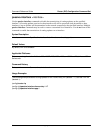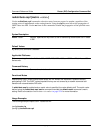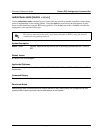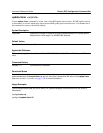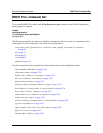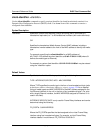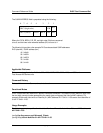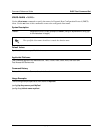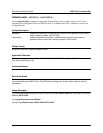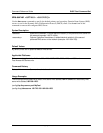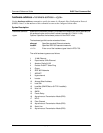
Command Reference Guide DHCP Pool Command Set
61200510L1-35E Copyright © 2005 ADTRAN 1328
client-identifier <identifier>
Use the client-identifier command to specify a unique identifier (in dotted hexadecimal notation) for a
Dynamic Host Configuration Protocol (DHCP) client. Use the no form of this command to remove a
configured client identifier.
Syntax Description
<identifier> Specifies a custom client identifier using a text string (that is converted to a
hexadecimal equivalent) or 7 to 28 hexadecimal numbers (with colon delimiters).
OR
Specifies the hexadecimal Media Access Control (MAC) address including a
hexadecimal number added to the front of the MAC address to identify the media
type.
For example, specifying the client-identifier for a MAC address of
d217.0491.1150 defines the client identifier as 01:d2:17:04:91:11:50 (where 01
defines the media type as Ethernet).
For example, a custom client identifier of 0f:ff:ff:ff:ff:51:04:99:a1 may be entered
using the <identifier> option.
Default Values
client-id By default, the client identifier is populated using the following formula:
TYPE: INTERFACE SPECIFIC INFO : MAC ADDRESS
Where TYPE specifies the media type in the form of one hexadecimal byte (refer
to
hardware-address <hardware-address> <type> on page 1334 for a detailed
listing of media types) and MAC ADDRESS is the MAC address assigned to the
first Ethernet interface in the unit in the form of six hexadecimal bytes. (For units
with a single Ethernet interface, the MAC ADDRESS assigned to Ethernet 0/1 is
used in this field).
INTERFACE SPECIFIC INFO is only used for Frame Relay interfaces and can be
determined using the following:
FR_PORT# : Q.922 ADDRESS
Where the FR_PORT# specifies the label assigned to the virtual Frame Relay
interface using four hexadecimal bytes. For example, a virtual Frame Relay
interface labeled 1 would have a FR_PORT# of 00:00:00:01.



